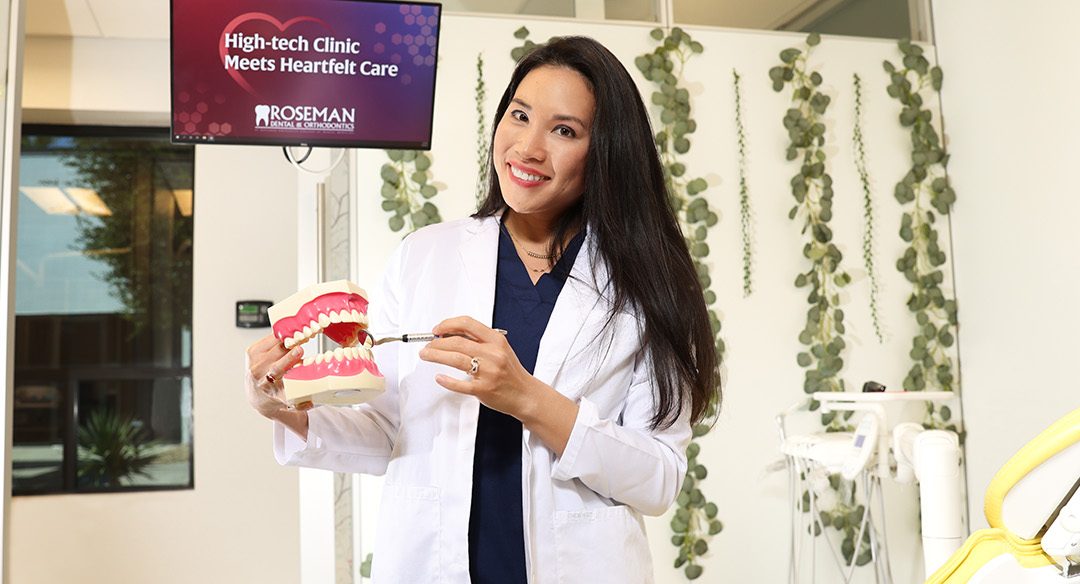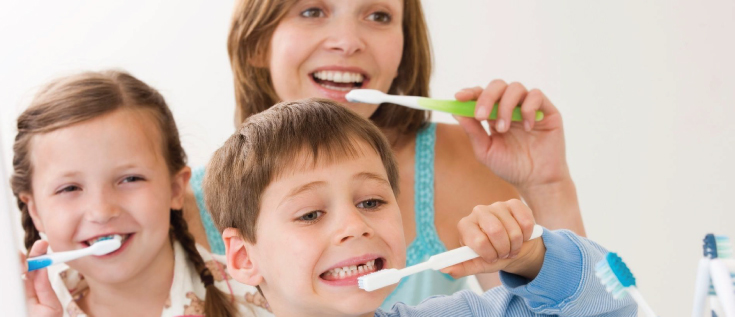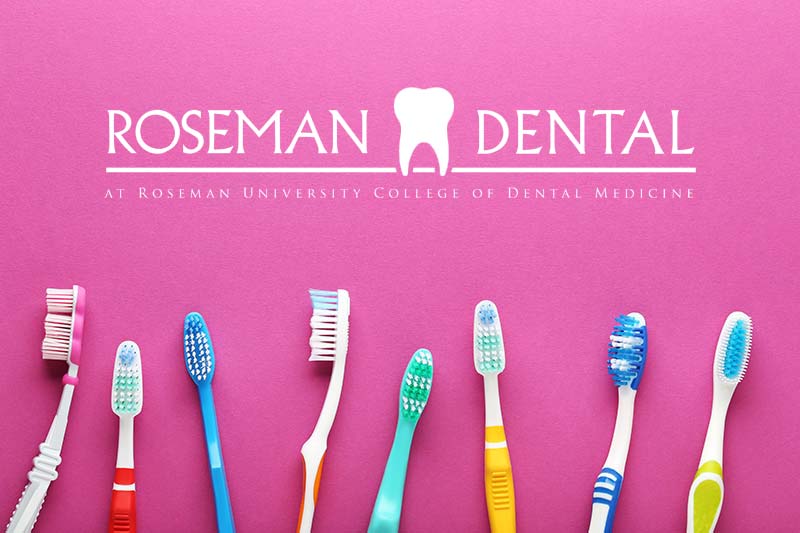
by Roseman Dental | Apr 18, 2023 | Dental 360, Dental Clinic Blog, Oral Health, Roseman Dental - NV, Roseman Dental - UT
Your teeth are important for everything from eating and nutrition to proper speech, so an injury to your teeth can have much larger implications than just affecting your beautiful smile. When engaging in certain kinds of physical activity, your mouth is potentially at risk for injury causing knocked-out teeth and injuries to the gums, lips, tongue, and surrounding tissues. Make sure you are always careful and take preventative measures to ensure you teeth and mouth stay healthy and injury-free.
Situations Where Tooth and Mouth Injuries Are Common
Most of your daily activities won’t put you at risk for tooth injury, but in the following situations you will want to have a mouth guard or take other precautions to prevent injury.
- Babies and toddlers who are learning to walk will stumble and fall a lot. It is important to keep an eye on them to make sure they are careful, and if they are in this early stumbling phase, don’t let them practice on a hard surface like concrete or asphalt.
- Sports injuries are a common reason for a visit to a dentist. Anyone who plays contact sports, such as boxing, football, basketball, soccer, or lacrosse needs to always wear a mouth guard. Even heavy physical exertion offers an opportunity to fall down and chip a tooth, so while it may not require a mouth guard, be sure to take care and watch your step!
- Some people experience tooth pain when they wake up after sleeping for the night. If you are one of these, you may be grinding your teeth in your sleep. A visit to a doctor or dentist will reveal if your tooth damage is the result of grinding and your dentist can help you decide if wearing a mouth guard when you sleep is the best option.
You don’t have to avoid risky situations to avoid mouth injury. Just make sure to take the appropriate precautions before you go at it.

by Roseman Dental | Sep 14, 2022 | Dental 360, Dental Clinic Blog, Providers - NV, Roseman Dental - NV
Dr. Chen recently joined Roseman’s College of Dental Medicine as a board-certified Pediatric Dentist at Roseman’s clinics in Henderson and Summerlin, NV. With a warm smile, kind face and gentle way about her, it is immediately obvious that she has a gift for connecting with children. Dr. Chen knew from a young age that she wanted to be a healthcare provider and that she wanted to use her hands in her profession. Shadowing an optometrist and dentist in high school, she connected quickly with the practice of dentistry but she had no particular plans or interest in treating children. Though Dr. Chen is the eldest of two girls in her family, she did not have a great deal of experience with or an affinity towards children, yet she found that her passion for pediatric dentistry grew while in her second year of dental school in Boston. She received her dental degree from Boston University and her specialty training in Pediatric Dentistry at Temple University. Originally from California, Dr. Chen received her bachelor’s degree in Psychology from UCLA with an emphasis in Developmental Psychology. In dental school, Dr. Chen worked alongside caring, compassionate faculty who took a great interest in mentoring her. Through this, she realized how important it was her to not only to provide preventative care, but to also ease pain and discomfort. Dr. Chen was born to parents who guided her not to a specific profession or interest, but toward an ethos, “be helpful and to take care of others.” She has most certainly followed this guidance in her professional life.
After a decade in private practice, in 2021, Dr. Chen made a personal decision to focus more time on the practice of pediatric dentistry and to let go of some of the administrative and business tasks associated with running a practice. When the opportunity arose at Roseman Dental & Orthodontics, it seemed like a perfect fit. “The opportunity at Roseman gave me the chance to place greater focus on doing what I love most—treating children. I couldn’t be happier about the opportunity to work in both of Roseman’s clinics. The entrée into academia also offered her the chance to return some of the goodwill and guidance offered to her by faculty when she was a student. In her new role, Dr. Chen has the chance to shape and inspire future providers.
Roseman Dental & Orthodontics, in addition to providing care to adults and children, is the home of the Advanced Education in General Dentistry (AEGD) residency, which hosts 2 residents per year through a partnership with NYU Lutheran Dental Medicine. These dentists receive advanced training through Roseman Dental & Orthodontics and are exposed to more complex cases. In her position, Dr. Chen is able to work alongside these residents, shaping their experiences and developing patient-centered practitioners while treating children. Roseman Dental & Orthodontics’ dental clinic also refers patients to Roseman Dental & Orthodontics’ ortho clinic, which is at the same address and next door.
Dr. Chen also practices at Roseman’s newest dental family member, Roseman Dental – Summerlin, Roseman’s pediatric dental clinic focused exclusively on treating medically compromised children in need of specialized dental care. Dr. Chen works alongside Dr. Michael Cottam, Clinic Director, to treat patients of Roseman’s partner organization, Cure 4 The Kids (C4K). C4K treats children with cancers, blood diseases and other life-threatening diseases. These children often put their dental needs aside, yet they need a dental home with dentists that work alongside their physicians to deliver what is often specialized care.
Dr. Chen is a beloved healthcare provider in the Nevada community. She brings to Roseman extensive experience, a deep commitment to improving the welfare and health of children, and a warm sense of optimism about her work. Dr. Chen and her husband Dr. Matthew Raddue, an anesthesiologist, enjoy being parents to their two children. Welcome Dr. Chen!

by Roseman Dental | Sep 7, 2022 | Dental 360, Dental Clinic Blog, Oral Health, Roseman Dental - NV, Roseman Dental - UT
Xerostomia is a big word with a simple definition: dry mouth. It’s the term for the absence of saliva in the mouth that can cause discomfort, often leading patients to seek medical treatment. The condition isn’t a disease in itself, but is actually caused by other factors.
While everyone experiences a dry mouth at one time or another, chronic dry mouth can not only be frustrating, but can also cause medical and dental issues. Treating xerostomia is important to improve overall quality of life as well as preventing any additional problems.
What Causes Xerostomia?
Many different issues can cause dry mouth. Some of the causes for this common condition include:
- Medications. Many over-the-counter and prescription drugs list dry mouth as a side effect.
- Nerve damage. Damage to the nerves that control saliva production can result in xerostomia.
- Cancer treatments. Chemotherapy drugs or radiation can halt the production of saliva.
- Other diseases. Parkinson’s or Sjogren’s syndrome can affect the salivary gland.
Other conditions, including stress and depression, can lead to a lower production of saliva as well.
What Problems does Xerostomia Cause?
Leaving xerostomia untreated can lead to further issues. The condition can cause difficulties with speech and eating, as well as an increase in cavities or infections in the mouth, since salvia helps wash away bacteria from the surface of the teeth.
What is the Treatment for Xerostomia?
To begin treatment for xerostomia, its root cause must be discovered. Eliminating the cause isn’t always possible, so dental professionals will find a treatment option that addresses the issue while not detracting from other medical care.
Some remedies can treat dry mouth, but they won’t cure it. These options include avoiding alcohol-based mouthwashes, using artificial saliva, sipping plain water, or using over-the-counter dry mouth products. Prescription medications can be used to stimulate saliva production in order to replace the saliva and prevent other medical and dental issues.
Dry mouth should be treated not only because of the discomfort it causes, but also because of the serious issues it can cause. Prioritize good oral care and regular dental treatments to prevent further problems. If you’re in need of dental care, make an appointment with Roseman Dental to get help from one of our empathic, patient-focused providers.

by Roseman Dental | May 11, 2022 | Dental 360, Dental Clinic Blog, Oral Health, Roseman Dental - NV, Roseman Dental - UT
One of the biggest advantages to living in the digital age is the overwhelming amount of information that is just a click away. However, with so much discussion regarding almost every topic imaginable, it is easy to understand why so many rumors and myths get passed around. Since the dental arena is not immune to perpetual misinformation, here are three common myths debunked:
Dental Myth #1
A fancier or more expensive toothbrush results in cleaner, healthier teeth.
The Truth
It is not the type of toothbrush you use, but the manner in which you use it that makes all the difference. Brushing twice a day for two minutes at a time is the key to healthier teeth and gums. This can be easily accomplished whether you opt to use a simple, soft bristle manual toothbrush, or a higher-end electric one. The most important factor is to be comfortable with your selection and use it on a consistent basis.
Dental Myth #2
The harder you brush, the better your results.
The Truth
Brushing your teeth harder does not improve your oral health. In fact, it can have potentially damaging effects! Excessive brushing with aggressive force can lead to enamel loss and gum recession, which can ultimately expose roots and cause sensitivity and tooth decay. If you are unsure if you are a harsh brusher, talk with your dentist so they can assess your routine and provide helpful suggestions. Part of an assessment by a dentist involves measurement and scoring of any potential gum recession. These measurements are taken at each visit and compared against each other to identify long-term recession.
Dental Myth #3
Regular brushing eliminates the need for regular dental cleanings.
The Truth
Plaque, a biofilm with a soft mashed potato-like consistency, begins to form on your teeth within 20 minutes after eating. If it isn’t brushed away within eight hours, it hardens into tarter that brushing cannot remove. Tarter build-up leads to gum disease and tooth decay. Only a dentist or dental hygienist will have the tools necessary to properly and effectively remove tarter from the teeth.
When it comes to oral health, false information can be damaging. The most important way to make your dental health a priority is by seeking out a reputable dentist who can dispel myths and provide you with the facts. Your mouth will thank you for it.

by Roseman Dental | Apr 11, 2022 | Dental Clinic Blog, Oral Health, Roseman Dental - NV, Roseman Dental - UT
Oral hygiene is essential for your overall wellbeing, not just your oral health. In fact, gum disease is a major risk factor for developing certain dangerous health conditions, such as diabetes and heart disease. Brushing regularly is one of the best methods for keeping your teeth and gums healthy. However, how do you know which toothbrush is best to use?
Tips for Choosing a Toothbrush
There are specific features to look for in a toothbrush, regardless of whether it is powered or manual. The variety of styles, sizes, and shapes of toothbrushes available can make choosing the right one overwhelming. Here’s what to look for:
- Expert recommendations. Look for powered or manual toothbrushes with the American Dental Association Seal of Approval. You can also ask your dentist for a recommendation to ensure your toothbrush has passed quality control tests for safety and cleaning effectiveness.
- Bristle options. Manual toothbrushes or replacement heads for your electric toothbrush are available with hard, medium, or soft nylon bristles. Soft bristles are the safest and most comfortable option for most people. You could damage the enamel protecting your teeth, root surface, and gums depending on the strength of the bristles and how vigorously you brush your teeth. Rounded bristle tips offer even more protection.
- Toothbrush head size. The best size of toothbrush head is one that permits easy access to the surfaces of all your teeth. A toothbrush head that’s one-inch tall and a half-inch wide is easy to use for most adults and can reach all of your teeth efficiently. The toothbrush should have a long enough handle to hold it comfortably in your hand.
Make sure to replace your toothbrush every three months or when it begins to show wear, whichever comes first. It is also vital to replace your toothbrush after you’ve had a cold because the bristles can accumulate bacteria and result in reinfection.







